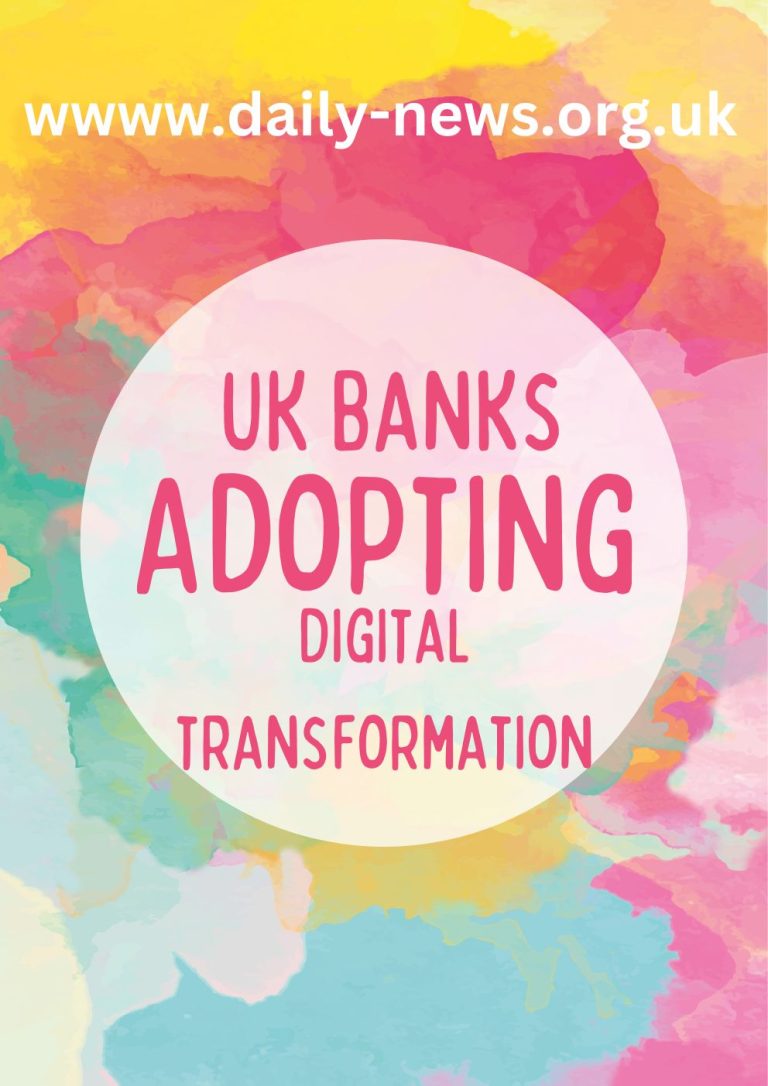UK banks digital transformation is taking place at a great pace. Through various technological advances they are in fact moving forward at a constant speed. The banking sector in the United Kingdom is undergoing a significant transformation driven by digital innovation.
As technology advances, banks are increasingly embracing digital solutions to enhance customer experience, improve operational efficiency, and stay competitive in a rapidly changing market.
This article explores how UK banks are adapting to digital transformation, highlighting key strategies, challenges, and future trends.
The Driving Forces Behind Digital Transformation in Banking
Several factors are propelling UK banks towards digital transformation:
- Customer Expectations: Modern consumers demand seamless, 24/7 access to banking services through digital channels. They expect personalized experiences, fast transactions, and robust security.
- Regulatory Pressure: Regulations such as the Second Payment Services Directive (PSD2) and the General Data Protection Regulation (GDPR) require banks to enhance data protection and enable open banking, driving the adoption of digital technologies.
- Competitive Landscape: Fintech startups and digital-only banks are disrupting the traditional banking model, offering innovative services that attract tech-savvy customers.
- Operational Efficiency: Digital transformation allows banks to automate processes, reduce costs, and improve efficiency, helping them remain profitable in a challenging economic environment.
Key Strategies for Digital Transformation
1. Embracing Open Banking
Open banking, mandated by PSD2, allows customers to share their financial data with third-party providers securely.
This has led to the rise of innovative financial services and products. UK banks are partnering with fintech companies to offer customers a broader range of services, such as budgeting tools, investment advice, and personalized financial products.
2. Investing in Fintech
UK banks are investing heavily in fintech to enhance their digital capabilities. For example, Barclays has launched its own accelerator program, Barclays Accelerator, to support fintech startups. Similarly, Lloyds Banking Group has invested in fintech companies to leverage their technology and expertise.
3. Enhancing Digital Channels
To meet customer expectations, banks are improving their digital channels, including mobile apps and online banking platforms. HSBC, for instance, has introduced the HSBC Kinetic app, designed specifically for small business owners, offering features like real-time cash flow insights and automated accounting.
4. Implementing AI and Machine Learning
Artificial intelligence (AI) and machine learning are revolutionizing banking operations. These technologies are being used to detect fraud, personalize customer interactions, and automate customer service through chatbots. NatWest has implemented an AI-based tool called Cora to handle customer inquiries, significantly reducing response times.
5. Strengthening Cybersecurity
With the rise of digital banking, cybersecurity has become a top priority. UK banks are investing in advanced security measures, such as biometric authentication, encryption, and real-time fraud detection systems, to protect customer data and prevent cyberattacks.
Challenges in Digital Transformation
1. Legacy Systems
Many UK banks still rely on legacy IT systems, which are expensive to maintain and challenging to integrate with modern digital solutions. Upgrading these systems requires significant investment and careful planning to avoid disruptions.
2. Regulatory Compliance
Complying with stringent regulations while adopting new technologies can be complex and costly. Banks must ensure that their digital transformation initiatives adhere to regulatory requirements, such as GDPR and PSD2, to avoid penalties and maintain customer trust.
3. Data Privacy and Security
As banks collect and process vast amounts of customer data, ensuring data privacy and security is critical. Any breach can lead to severe reputational damage and financial loss. Banks must implement robust data protection measures and regularly update their security protocols.
4. Skills Gap
Digital transformation requires specialized skills in areas like data science, cybersecurity, and AI. There is a shortage of these skills in the UK, making it difficult for banks to find and retain the talent needed to drive their digital initiatives.
Future Trends in Digital Banking
1. Blockchain and Distributed Ledger Technology
Blockchain technology has the potential to revolutionize banking by providing secure, transparent, and tamper-proof transactions. UK banks are exploring blockchain for applications such as cross-border payments, trade finance, and identity verification.
2. Banking as a Service (BaaS)
Banking as a Service (BaaS) is emerging as a key trend, allowing third-party providers to offer banking services through APIs.
This enables fintech companies to integrate banking services into their platforms, offering customers a seamless experience. UK banks are leveraging BaaS to expand their reach and offer innovative services.
3. Personalization Through AI
AI and machine learning will continue to play a crucial role in personalizing banking services. By analyzing customer data, banks can offer tailored financial products and advice, improving customer satisfaction and loyalty.
4. Sustainable Finance
Sustainability is becoming increasingly important in the banking sector. UK banks are adopting digital tools to promote sustainable finance, such as offering green loans and investing in environmentally friendly projects.
Digital platforms enable banks to track and report on their sustainability efforts more effectively.
5. Enhanced Customer Experience
The future of banking will be centered around delivering an exceptional customer experience. Banks will continue to invest in technologies that simplify banking processes, offer real-time assistance, and provide personalized services.
The use of virtual reality (VR) and augmented reality (AR) in customer interactions is also expected to grow.
The digital transformation of UK banks is an ongoing journey driven by customer expectations, regulatory requirements, and technological advancements.
By embracing open banking, investing in fintech, enhancing digital channels, implementing AI, and strengthening cybersecurity, UK banks are positioning themselves to thrive in the digital age.
While challenges such as legacy systems, regulatory compliance, data privacy, and skills gaps remain, the future of banking looks promising with emerging trends like blockchain, BaaS, personalization through AI, sustainable finance, and enhanced customer experience.
As banks continue to innovate and adapt, they will be better equipped to meet the evolving needs of their customers and stay competitive in a rapidly changing financial landscape.


